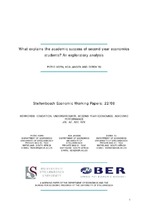| dc.description.abstract | The factors influencing academic success of first-year Economics students have received much attention from researchers. Very little attention, however, has been given to the determinants of success of senior Economics students. In the USA, Graunke and Woosley (2005: 367) indicate that college sophomores (second years) face academic difficulties, but this receives little attention in the literature. Economics is an elective subject for second-year students at Stellenbosch University. The academic performance of the second-year students has shown a decline, as compared to the first-year Economics performance and the faculty’s average performance. An observed phenomenon at Stellenbosch University is the poor attendance of lecture and tutorials by second year students, some of the factors than can perhaps explain why students perform poorly. This phenomenon may be explained in part by second year students losing interest in academic activities, focusing on other social commitments. This study investigates the academic success of second-year Economics students. It adds to the existing literature on the factors affecting the academic success of Economics students by focusing on the second-year students (a much neglected group in empirical studies, particularly in South Africa). The empirical analyses confirm some of the existing findings in the literature, namely that lecture and tutorial attendance are important contributors to academic success. We also find that as students progress to Economics at the second-year level, their performance in individual matriculation subjects is less relevant, except for those students who had taken Additional Mathematics. However, the matriculation aggregate mark is significant in explaining the academic performance, in a non-linear way. An important finding is that non-White students tend to perform more poorly in essay writing (one of the components of the course mark in the second year) than White students. | en_US |

